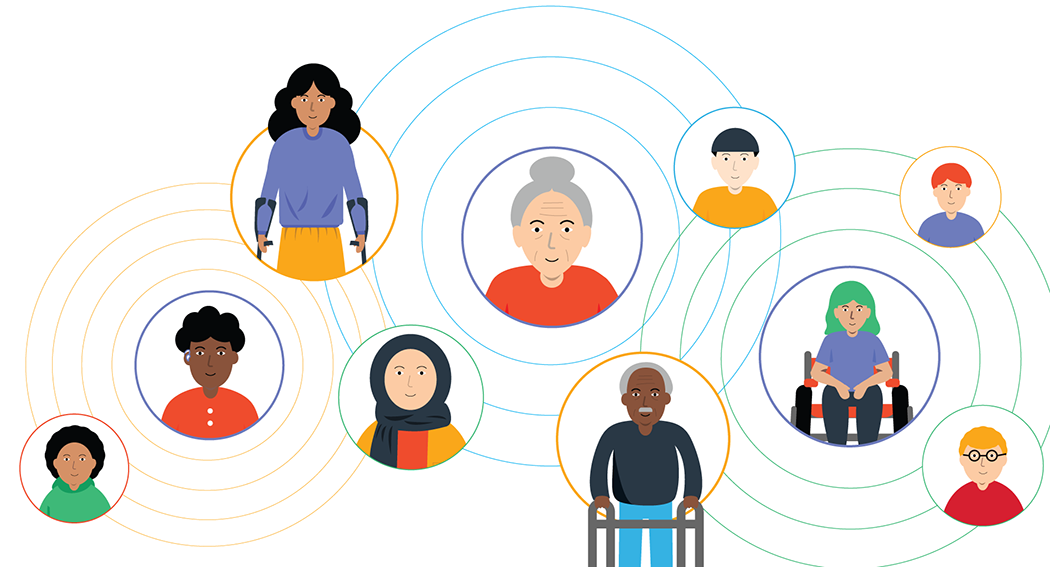
Photo credit: FHI 360
Organizations are at their best when they welcome, respect and include people of all backgrounds, including people with disabilities. At FHI 360, we prioritize disability inclusion and are continuously working to strengthen our practices and culture. But we know our work is not — and will never be — done.
Habtamu Buli (“Buli”) is a disability inclusion technical officer at FHI 360. Below, Buli, who is Deaf, has a conversation with his supervisor of five years, Senior Technical Advisor, Gender, Equity and Social Inclusion Elise Young, who is hearing, about how organizations can better support staff with disabilities.
ELISE: Why did you pursue a career in international development and disability inclusion?
BULI: Growing up in rural Ethiopia, I saw international development workers in my area, many working on crisis response. I wanted to help, but I didn’t know what was possible, being Deaf.
Later, at Addis Ababa University, I witnessed and experienced discrimination. People with disabilities couldn’t access classrooms. There were few Deaf students like me, and we did not have access to interpreters during classes.
That’s when I became an advocate for disability rights in education and employment. First, I served as President of the National Deaf Association of Ethiopia. Next, I pursued a master’s in international development at Gallaudet University [a university for Deaf and hard of hearing people], specializing in the intersection of gender and disability. I thought that a career in global development would help me address rights issues on a global scale.
BULI: Why did you decide to work in international development?
ELISE: I grew up in a suburban, majority white area near Philadelphia, Pennsylvania. I studied in Cameroon and served as a Peace Corps volunteer in Benin, where I realized that I wanted to support global human rights. In Benin, I had a severe accident, resulting in a traumatic brain injury. This changed my world. It took me years to rehabilitate. It also introduced me to new concepts around accessibility.
In 2017, I helped organize a workshop on women’s economic empowerment in South Africa. One participant, Catherine Edeh — at the time, the only Deaf woman lawyer in Nigeria — challenged me to learn and support everything I could around disability inclusion. It was a wake-up call.
ELISE: What challenges did you face when you joined FHI 360?
BULI: I felt anxiety, because I didn’t know if FHI 360 had ever worked with someone like me before. Once I joined, I could see organizational gaps, as someone who is Deaf and a person of color. Accessibility was an issue. Most people didn’t know sign language. We didn’t have enough consistent time with preferred ASL interpreters.
However, many people — including you, as my supervisor — embraced me and were excited to learn more about Deaf culture. Positive change happened over time. Interpreting services slowly increased and improved. Over 60 employees took our ASL 101 class. We educated people on Deaf culture and disability inclusion. Diversity, equity and inclusion efforts solidified. We’ve come a long way!
BULI: What were your initial expectations, supervising me as a Deaf employee?
ELISE: I was excited when we partnered with Gallaudet University on an internship [Buli began at FHI 360 as an intern]. But I was nervous. I worried I might do something wrong or say something offensive. I turned to colleagues at Mobility International USA for advice. I learned that I needed to ask more questions, schedule more time for one-on-one meetings, and support ASL. I also began studying ASL so that we could communicate more directly.
ELISE: How can we support the recruitment, accessibility and wellness of employees who are Deaf or have disabilities?
BULI: It starts with recruiters and hiring managers. So far, there is good awareness and progress with our recruiters, but we need more among hiring managers and supervisors — for example, when it comes to posting jobs, checking outdated terminology and requirements on job descriptions (like the ability to speak, hear, stand, and lift things), and preparing for interviews in accessible spaces and languages. We must continue providing learning events on disability inclusion and Deaf culture for all staff. Offering ASL classes to hearing staff members is another good idea.
Organizations need to provide accessible facilities, internal systems and services, including captions for audio-visual materials, materials in Braille and communication systems that are accessible to applicants and employees living with disabilities.
Allocate a central budget to support reasonable accommodations for staff with disabilities. When projects are not solely responsible for paying for reasonable accommodations, that budget allows project hiring managers engage staff with disabilities who require more extensive support.
Finally, recognize the intersectionality of disability and overlapping identities. The accessibilities and accommodations that work for me may not work for another Deaf staff member; it is important to respect that.
BULI: What advice would you give to other supervisors of employees who are Deaf?
ELISE: Talk less and listen more! Don’t assume that you know what your team member needs or what they have the capacity to do. Ask.
Try to learn more about Deaf culture and sign language. Supervisors also need to advocate and budget for sign language interpretation if that is the requested accommodation.
Finally, work to unlearn old narratives that being Deaf is a deficit. Buli, you’ve taught me that in fact, it is an incredible strength, helping us all to see the world and tackle global challenges in new and creative ways.
